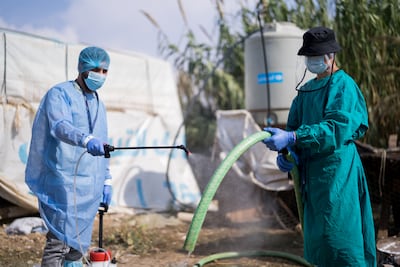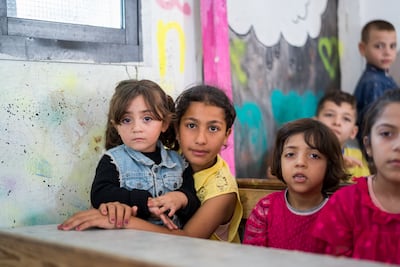First it was the fever.
Then 4-year-old Ruqqaya, who lives in an informal camp in Lebanon’s northern Akkar region, only a few minutes from Syria, suffered more than seven rounds of diarrhoea in just 24 hours.
She was exhibiting classic symptoms of cholera, the disease that can prove deadly within hours if left untreated and has re-emerged in Lebanon for the first time in three decades.
Humanitarian workers visiting the camp urged Ruqqaya’s parents to take her to a nearby hospital, where her condition began to improve after she was given intravenous therapy.
“I was scared at the beginning when they told me it’s cholera. I was afraid that it’s a very dangerous disease,” said her father Ali, 23, who is originally from Hama in Syria but has lived in the informal settlement for five years.
Since cholera first emerged in Lebanon last month at a Syrian refugee camp, 18 people have died and there have been more than 3,000 confirmed or suspected cases. According to Lebanon's health ministry, a quarter of confirmed or suspected cases are among children up to 4 years old.
While cases have been confirmed in all of Lebanon’s eight governorates, they are most prevalent in areas bordering Syria — particularly Akkar, a rural region and Lebanon’s poorest.
The cholera strain in Lebanon is similar to the one in neighbouring Syria, which is itself grappling with a major outbreak.
Ali says he was aware of the cholera situation in Syria, but said he “never thought it would arrive in Lebanon”.
The Lebanese government and humanitarian organisations are moving to contain the outbreak and treat those affected. But the country is engulfed by a severe economic crisis that has led to huge shortages in medicines, clean water and electricity.
There are fears that Lebanon’s ailing health infrastructure could struggle to deal with a larger outbreak if cholera spreads further.

According to the World Health Organisation, cholera transmission is closely linked to inadequate access to clean water and sanitation facilities.
It says typical at-risk areas include peri-urban slums and camps for internally displaced people or refugees, where clean water and sanitation needs are often not met.
Informal settlements where families such as Ali’s live often have extremely poor sanitation, providing a perfect setting for cholera to take hold.
It is believed Ruqqaya’s infection came from a contaminated bore hole near by that those in the camp normally use — including for drinking water — although Ali says they have not had stomach problems from it before.
He has two children — Ruqqaya and a 2-year-old boy — and his wife Hiba is eight months pregnant.
Ruqqaya is recovering and back home. However, she is still not eating well and continues to have some stomach discomfort, Hiba says.

Akkar is a largely rural region — the camp where Ruqqaya lives is in an agricultural area among chickens and cows, with narrow back roads criss-crossing through farms and crops.
The family is forced to get by on the equivalent of less than $40 a month in a country where inflation is rampant.
“Most of our work is seasonal work in agriculture. Today, the situation in Lebanon is very difficult,” Ali says. “We are not even able to buy bread every day. It’s been more than three months that we have had zero electricity in this camp.”
Hiba says they often do not have enough money for nappies for the children.
“If I wasn’t pregnant, I would have gone to work in the fields and helped my husband.”
Now the government and humanitarian groups are trying to provide safe forms of water while treating potential sources of infection. As representatives from Unicef and its local partners watched on in Ruqqaya’s camp, lorries carrying clean water could be seen coming in as human waste is disinfected.
Education and spreading awareness is also extremely important. Cholera can be easily treated with oral rehydration salts, but in severe cases, immediate medical attention is needed.
At another informal settlement in Akkar, about 30 children, two or three to a bench, cram into a classroom to watch a video. It shows the risk factors — from defecating in the open, to consuming unclean food or water — and how quickly cholera can spread.
The first batch of vaccines — more than 13,000 — has arrived in Lebanon, but Unicef has issued an appeal for more than $38 million in funding to cover the humanitarian response for the first three months.
“What we see is that children are being disproportionately affected. In many cases, they have a compromised immune system because their immune systems have been undernourished,” says Ettie Higgins, Unicef's deputy representative in Lebanon.
“Many of them haven't received proper health care for quite some time. They've missed out on essential vaccines and these are the children who are not only getting more ill with cholera, they're also succumbing to it.”










